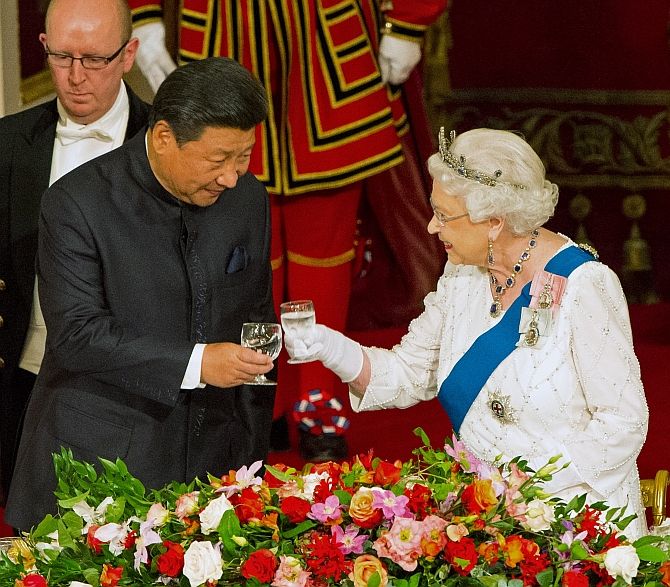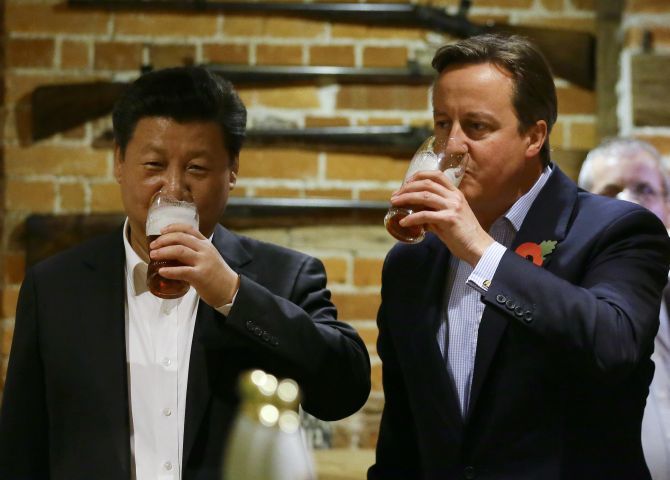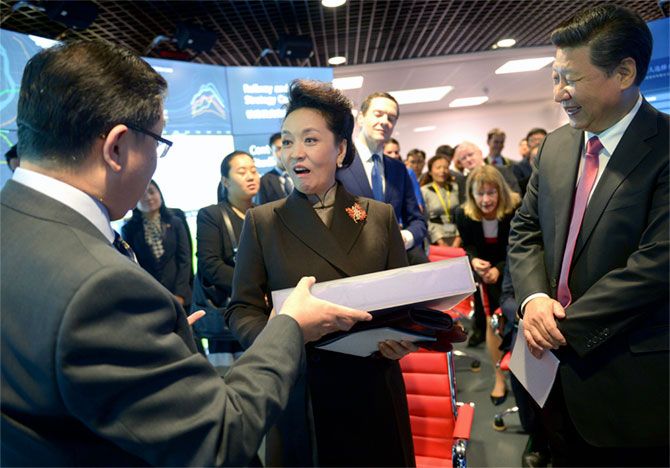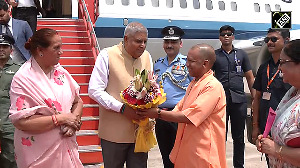'The "Hollandisation" of British policy may not bring the expected gains as the future may show,' says Claude Arpi.

Have you heard of 'Hollandisation'?
It is a new concept in geopolitics.
The term is used to express 'abandoning the pursuit of power, spending less on defence and stepping back from playing a role on the international stage.' According to The Financial Times, this is what Britain did when it kowtowed to Chinese President Xi Jinping during his visit to the United Kingdom last week.
Even 'the US,' FT commented, 'is worried about the "Hollandisation" of Britain, (US) officials are particularly disconcerted with (Britain's) stance on China.' British officials, the newspaper added, could just 'haggle over whether the Sino-British relationship had entered a "golden decade" or a "golden era".'
For Beijing, the visit was a resounding success.
President Xi and his First Lady Peng Liyuan were greeted by Queen Elizabeth II and Prime Minister David Cameron at the Horse Guards parade ground in central London where the Chinese leader inspected the Grenadiers in scarlet tunics and bearskin hats. Xi was then granted a 41-gun salute.
Xi, his wife and their royal hosts took a 1 km ride in a gilded carriage drawn by white horses, from the Mall to Buckingham Palace.
First small hitch, as the coach moved through the Mall, lined with China's fans with British and Chinese red flags (supplied by the Chinese embassy), supporters of Free Tibet waved Tibetan flags with banners reading 'Don't trade away human rights' and 'China: Buying UK's silence on Tibet.' This does not seem to have much bothered the smiling Chinese president.
It showed the dichotomy of today's China: The emperors of the mighty Middle Kingdom can dictate their will to most of the world's governments, but not always to the 'masses.' Cameron's spokeswoman said: 'There is nothing off the table in our discussions with the Chinese,' but few believed her.
In the autumn of 1991, when John Major traveled to Beijing, the British prime minister was the first Western leader to visit China after the Tiananmen massacre.
Before departing for Beijing, Major announced that he would present a list of several hundred political prisoners (prepared by Amnesty International) to the Chinese leadership. After meeting then premier Li Peng, Major confirmed to the media that he had passed on the list; everyone praised Major's moral courage.
Later, it was discovered from a British official who attended the meeting that Major had never shown the list to Li Peng nor had he said a word about human rights. The British prime minister had lied. Business was already business.
When Xi addressed the House of Commons -- the British parliament -- last week and reviewed the historic relationship between Britain and China, he 'painted a promising future in which the countries became a community of shared interests.'
Xi praised Britain for being the first nation to join the Asian Infrastructure Investment Bank as a founder member (a move which deeply irritated Washington).
Indirectly, he mentioned human rights (with Chinese characteristics!): 'China's first code of statutes was compiled more than 2,000 years ago,' adding that the Chinese people are 'drawing inspiration not only from China's own legal tradition, but also the best practices of other countries.'

The British government was quick to reject accusations of pandering to Beijing in order of securing mega investments (including the building of nuclear power plants) to the tune of 30 billion pounds.
Britain's kowtowing to Beijing was compared by analysts to the US firm stand on China, particularly during Xi's visit to the US last month. Washington did not vacillate on the '5 big challenges' mentioned before Xi's visit to the US.
First, 'cybersecurity,' an important source of tension between China and the US. Then, 'climate change.' China, the world's largest emitter of carbon dioxide, was forced to pledge to work towards a new global climate change agreement during the UN Climate Change Conference in Paris in December. The economy was the third issue on the agenda for which Washington did not show Xi any favours.
Trickier was the tension in the South China Sea, on which Obama took a firm stand. Human rights was the final issue. Obama mentioned the 'T' word during the joint press conference.
It was not the case in London.
Before Xi arrived in UK, the People's Daily sanitised the visit by mentioning Beijing's eight important messages for the world. Here are some of them:
Will China's economy survive? 'Yes,' declared the Communist mouthpiece.
Will China become a 'world policeman' as it gets stronger? 'No.' China 'did not accept the logic that a strong nation is bound to seek hegemony.'
Will China back down or expand its presence in the South China Sea? People's Daily noted: 'The Chinese people will not allow anyone to infringe on China's sovereignty, (but) China would continue to work with its neighbours in the area to manage disputes through institutionalised dialogue.'
Why does China insist on a socialist path? 'One pair of shoes need not be the same as another; it only needs to fit the wearer's feet.' For the People's Daily, Communism fits China's feet.
Will China's embrace of 'opening up' ever be reversed? No, because China will uphold the opening up strategy based on mutual benefits and win-win results.
Will 'One Belt, One Road' be exclusively for China? No, the new Chinese project is 'an open sphere of friends that connects Asia, Africa and Europe -- one which all interested countries can join.'
Before Cameron and Xi met for dinner at Chequers, the British prime minister's country home, both leaders went to a pub for a pint of English ale and a plate of fish and chips.
Duowei News, a US-based Chinese political news channel, argued that Xi's visit was part of an overall strategy to align the interests of China and Europe. 'Beijing sees Xi's visit as having the potential to spark a chain reaction with widespread consequences for the entire region,' Duowei wrote.

Was the visit a win-win-win situation for the Chinese president?
The visit took place a few days before the crucial 5th Plenum of the Communist Party's 18th Congress and says a great deal about Xi's control over the national scene.
Prince Charles, the heir to the British throne, was nowhere to be seen at the dinner his mother hosted for Xi at Buckingham Palace, though he and his wife Camilla later offered Xi and Peng a cup of tea at Clarence House.
The Chinese media mocked the 'Dissident Prince:' 'Seeing this (the tea party)', the Dalai Lama would keep sniffling since he got snubbed in Britain in September.' Xinhua recalled that 'the Dalai Lama's request for a meeting with Prime Minister David Cameron was denied by Downing Street, and even Prince Charles, regarded by the Dalai Lama as the "best friend," avoided (lately) meeting him.'
The Chinese news agency said Prince Charles had been one of the Dalai Lama's greatest supporters and would severely reprimand each visit by Chinese leaders to Britain. Cameron himself, who dared to meet the Tibetan leader in London in 2012, paid a heavy price 'leading to China's cold shoulder to Britain diplomatically.' In other words, no more contracts!
Xinhua quoted the Dalai Lama's reaction after being denied a meeting at Downing Street: 'Money, money, money. Where is the morality?'
After the Xi-Charles tea party, Xinhua advised the Dalai Lama: 'Don't sweat blood. Even your "best of friends" did so, why not chew the cud?'
Though George Osborne, the British chancellor of the exchequer, admitted before the visit: 'I want to take a bit of a risk with the China relationship,' London has probably gone too far. The 'Hollandisation' of British policy may not bring the expected gains as the future may show.











